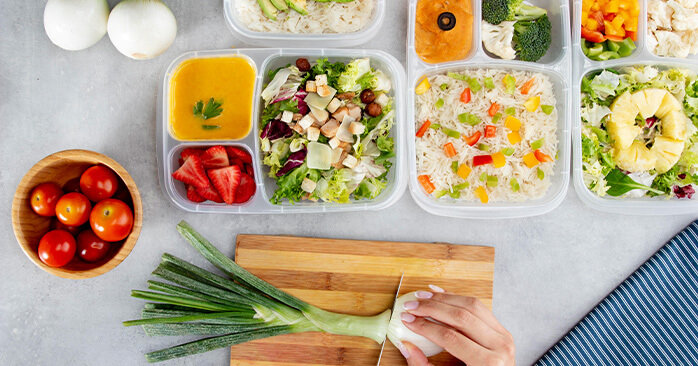Blog
How to Incorporate More Fruits and Vegetables into Your Diet

According to a study published this month by the Centers for Disease Control and Prevention (CDC), as much as 80 percent of the population is not consuming the recommended amount of fruits and vegetables.
We live in a society consumed by countless dietary trends and fads, but one thing remains unchanged: the vital role of fruits and vegetables in our daily nutrition. They're not just side dishes or garnishes. They are the backbone of a healthy diet.
It’s important to remember that nutrition is not just about flavour and aesthetics. In this fast-paced, modern lifestyle, it's easy to neglect whole-food meals in exchange for takeout food or quick cravings on the go. Fruits and vegetables are nutritional powerhouses, packed with vitamins, minerals, and antioxidants. They're your first line of defence against chronic diseases, and they play a pivotal role in maintaining a healthy weight and promoting better digestion.
In today’s blog post, we will talk all about fruits and vegetables, understanding their benefits, and sharing practical strategies on how to incorporate them into your daily diet. Get ready to transform your eating habits and nourish your body from within.
As always, our team at Cook’s RX is here to help you in your health journey. You do not have to navigate this part of your life alone. If you’re still unsure about how to incorporate more produce into your diet or anything else related to healthy eating, reach out to us and we will help you out.
The Benefits of Eating More Fruits and Vegetables
Incorporating more fruits and vegetables into your diet not only provides essential nutrients but also offers a wide range of health benefits that can positively impact your overall well-being.
Nutritional Advantages
Vitamins and Minerals: Fruits and vegetables are rich sources of essential vitamins like vitamin C, vitamin A, and various B vitamins, as well as important minerals such as potassium and magnesium. These nutrients are crucial for maintaining overall health and supporting various bodily functions.
Dietary Fibre: One of the best things about fruits and vegetables is their high dietary fibre content. Fibre helps with digestion, regulates blood sugar levels, and promotes a feeling of fullness, making it an excellent asset for weight management.
Antioxidants: Fruits and vegetables are packed with antioxidants like flavonoids and carotenoids, which combat harmful free radicals in the body. These antioxidants play a key role in reducing the risk of chronic diseases and supporting cellular health.
Health Benefits
Lowers the Risk of Chronic Diseases: Regular consumption of fruits and vegetables has been associated with a reduced risk of chronic diseases such as heart disease, stroke, and certain types of cancer. The antioxidants and phytochemicals found in these foods contribute to their disease-fighting properties.
Weight Management: Fruits and vegetables are naturally low in calories and high in fibre. This combination makes them ideal for weight management, as they help control hunger and reduce overall calorie intake, leading to healthier body weight.
Improved Digestion: The fibre in fruits and vegetables promotes healthy digestion by preventing constipation and supporting regular bowel movements. Also, the water content in these foods aids in keeping the digestive tract hydrated and functioning optimally.
Assessing Your Current Diet
Making any lasting change in your life starts with first taking a real and honest look at your current situation.

Before attempting to increase fruit and vegetable intake, it's important to take a step back and evaluate your current dietary habits. Assessing your fruit and vegetable intake is about self-awareness, allowing you to ask important questions about your eating patterns.
Here are a few to help you get started:
Are you reaching the recommended daily servings of fruits and vegetables?
Which fruits and vegetables do you consume most frequently?
Which ones are often overlooked?
Answering these questions will help you pinpoint specific aspects of your diet that may need adjustment. It could involve recognizing days when fruits and vegetables are conspicuously absent from meals or acknowledging that processed snacks have become default choices. This introspection sets the stage for personalized and practical strategies to incorporate more of these nutritious foods into your daily routine, ultimately paving the way for a healthier and more balanced diet.
How To Incorporate More Fruits and Vegetables into Your Diet
Now comes the fun part! We understand that change is hard, but we believe that you are capable of doing the hard things that allow you to become healthier and happier.
We’ve put together some practical strategies and creative ideas to make incorporating more fruits and vegetables into your diet an enjoyable and achievable goal. Tailor these tips to your preferences and lifestyle to make lasting improvements in your overall nutrition.
Setting Realistic Goals
Begin by setting achievable goals for increasing your fruit and vegetable intake. These goals should be specific, measurable, and tailored to your current habits and preferences. Gradual changes are often more sustainable and less overwhelming than drastic dietary overhauls.
Shopping Smart
Buying Fresh and In-Season: Opt for fresh fruits and vegetables that are in season. They tend to be more affordable, flavourful, and nutritionally dense. Local farmers' markets are great places to find seasonal produce.
Exploring Frozen and Canned Options: Don't underestimate the convenience of frozen and canned fruits and vegetables. They are often just as nutritious as fresh and have a longer shelf life, making it easier to incorporate them into your meals.
Meal Planning and Preparation
Batch Cooking: Dedicate some time on the weekend to batch cook and prep fruits and vegetables. This will be such a time saver during the week when you’re run off your feet. It will also help you curb those impulses to grab takeout or turn to your snack drawer for something easy. Wash, chop, and store them in portioned containers for easy access when you're in a hurry or not in the mood for extensive meal prep.
Pre-Cutting and Prepping: Having pre-cut veggies readily available encourages their inclusion in meals and snacks. Keep a container of sliced cucumbers or carrot sticks in the fridge for quick, healthy munching.
Sneaky Ways to Add Veggies to Your Meals
Smoothies: Blend spinach, kale, or other leafy greens into your morning smoothie. The sweetness of fruits can mask the taste of greens, making it a palatable way to boost your vegetable intake.
Veggie-Based Sauces: Incorporate finely grated or pureed vegetables like zucchini, carrots, or bell peppers into pasta sauces, soups, or chilli. This not only adds nutrition but also enhances flavour and texture.
Healthy Snacking with Fruits and Vegetables
Keep a bowl of fresh fruit on your countertop and sliced veggies in the fridge for easy, nutritious snacking. Pair them with hummus, yogurt dip, or nut butter for added taste and satisfaction.
Creative Recipes and Cooking Ideas
Salad Variations: Salads do not have to be boring! Experiment with different salads using a variety of fruits, vegetables, and grains. Consider adding fruits like strawberries, apples, or pomegranate seeds for a sweet twist.
Stir-Fries: Whip up colourful stir-fries with an assortment of vegetables and lean protein. The versatility of stir-fries allows you to experiment with different flavours and sauces.
Roasting and Grilling: Roasting or grilling vegetables enhances their natural flavours and textures. Try roasted brussels sprouts or grilled eggplant for a tasty change.
Vegetable-Based Pasta Dishes: Replace some or all of the pasta in your favourite pasta dishes with spiralized zucchini (zoodles) or spaghetti squash for a lower-carb, veggie-packed alternative.
Overcoming Common Barriers
Overcoming common barriers to increasing fruit and vegetable consumption is crucial for sustained dietary improvements.

This involves both letting go of common excuses like time constraints and budget limitations and providing practical solutions and motivational guidance, including time-saving cooking methods and cost-effective shopping tips, to empower yourself in your journey toward a healthier and more balanced diet.
Consistency Is Key
Consistency in incorporating fruits and vegetables into your diet is everything to seeing long-term health benefits. It's not just about a one-time effort; it's a sustained commitment to making these foods a fundamental part of your eating habits. Tracking your progress provides a tangible way to measure your success and helps you stay on course while celebrating small victories, such as trying a new vegetable or consistently meeting your daily fruit and veggie goals. This keeps you motivated and reinforces the importance of your dietary choices.
Final Thoughts
We understand that change is hard, but we believe that you are capable of doing the hard things that allow you to become healthier and happier.
Incorporating more fruits and vegetables into your diet will allow you to prioritize health and wellbeing, and help you live your best life. We hope that the practical strategies we shared with you above will help you in your journey toward a healthier and more balanced diet.
As always, our team at Cook’s RX is here to help you in your health journey. You do not have to navigate this part of your life alone. If you’re still unsure about how to incorporate more produce into your diet or anything else related to healthy eating, reach out to us and we will help you out.
Any medical or pharmaceutical information on this site is provided as an information resource only and is not to be used or relied on for any diagnostic or treatment purposes. This information does not create any patient-pharmacist relationship, and should not be used as a substitute for professional diagnosis and treatment.
Please consult your healthcare provider before making any healthcare decisions or for guidance about a specific medical condition.
Cook’s Pharmacy and its subsidiaries expressly disclaim responsibility and shall have no liability, for any damages, loss, injury, or liability whatsoever suffered as a result of your reliance on the information contained in this site.
Contributors
Latest Posts
Show All Recent Posts
Archive
-
2025
-
June
-
May
-
April
-
March
-
February
-
January
-
-
2024
-
December
-
November
-
October
-
September
-
August
-
July
-
June
-
May
-
April
-
March
-
February
-
January
-
-
2023
-
December
-
November
-
October
-
September
-
August
-
May
-
April
-
March
-
February
-
January
-
-
2022
-
December
-
November
-
October
-
September
-
August
-
July
-
June
-
May
-
April
-
February
-
